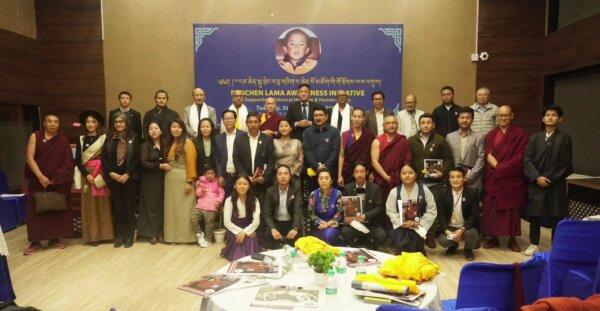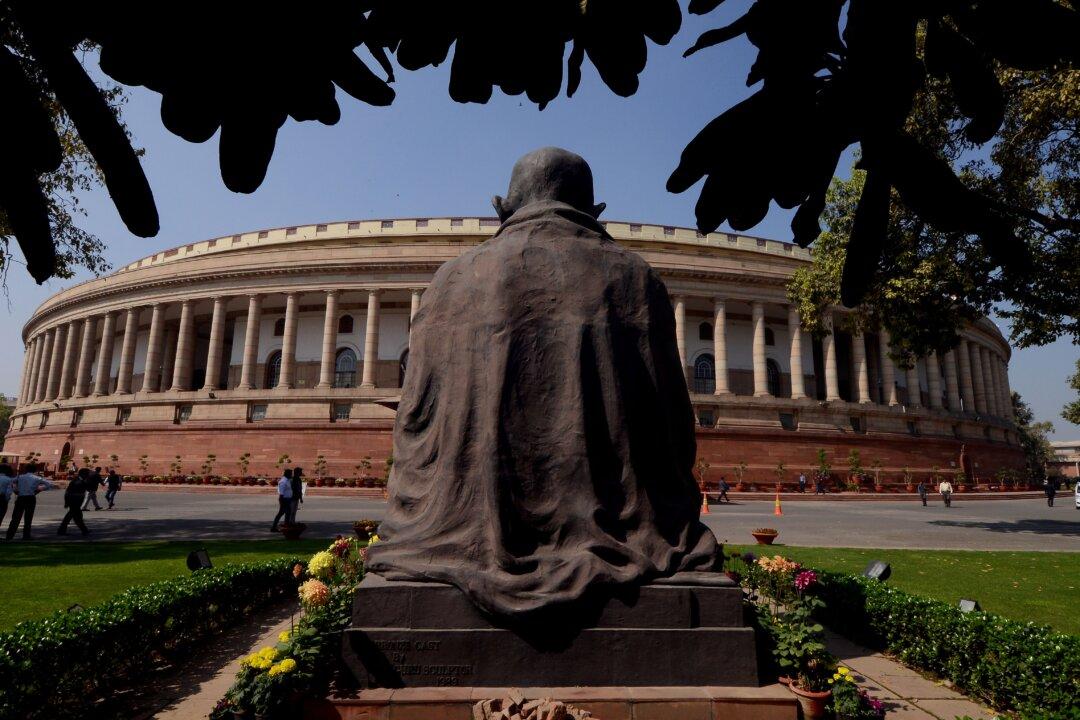NEW DELHI—In a first-of-its-kind move, Indian lawmakers have officially raised concerns about the persisting human rights crisis in China.
While one legislator raised his concern in the Indian Parliament on Dec. 5, others voiced their worry in a gathering of lawmakers, human rights activists, concerned citizens, and media in the capital on the same day.
Aneel Prasad Hegde, a member of the Indian Parliament’s upper house—the Rajya Sabha—raised the issue of the persecution of Falun Gong practitioners and Uyghur Muslims before the house on Tuesday. He urged the Indian government to start a campaign to oppose such violations.
“Millions of people including the Falun Dafa practitioners [and] Uyghur Muslims in Xinjiang are subjected to forced labor in Chinese prisons,” Mr. Hegde told the Indian Parliament.
The Indian lawmaker later told The Epoch Times that he has been trying to raise the issue of China’s human rights violations for over a year but “for various reasons, diplomatic reasons or whatever, it hasn’t been allowed.”
Mr. Hegde stressed that human rights violations inside China have a direct economic impact on India.
“Because of the violations of human rights, labor laws, and environment laws, our neighbor is able to manufacture cheap goods, which [in turn] makes us less competitive,” he said.
He also raised the issue of organs harvested illegally from Falun Gong practitioners and Uyghurs, stating that organ harvesting is a flourishing trade inside China. He urged the Indian government to take an ethical stand on the issue.
“So long as we don’t plug the hole by starting a campaign to stop human rights violation, labor law violation, environment law violation inside China, I feel it'll be difficult for India’s manufacturing sector to improve,” said Mr. Hegde, a member of the Janata Dal political party.

Bringing Attention to Abducted Spiritual Leader
Dec. 5 also marked the beginning of the Panchen Lama Awareness Initiative, a campaign to re-ignite attention to the “world’s youngest political prisoner,” the abduction of the Panchen Lama.Second only in authority to the Dalai Lama, the Panchen Lama is an important figure in the Gelug tradition of Tibetan Buddhism. In 1995, the Chinese communist regime seized the eleventh Panchen Lama, who was then only six years old, and installed their own “soul boy” as Panchen Lama. The whereabouts of the kidnapped spiritual leader—who would now be 33—and his family are still unknown. The U.S. Commission on International Religious Freedom has repeatedly called for his release.
At the campaign’s launch, which took place at New Delhi’s Constitution Club, other members of Parliament raised concerns about human rights violations by the Chinese regime.
“China has been systematically committing a genocide in Tibet and Xinjiang. Tibetans have become second-class [or] third class citizens on their own soil,” Mr. Kumar said.
Mr. Kumar, a lawyer and trained arbitrator who practices in India’s Supreme Court, noted that although “the sun never set on the British empire,” eventually its two-century rule of the Indian subcontinent came to an end.
‘Hypocrisy’ of Chinese Regime
Other Indian lawmakers participating in the Constitution Club discussion said that the crisis inside today’s China isn’t limited to human rights alone but is linked with global peace and civilizational identities.“It’s just not a political agenda but is linked to issues of human rights, ancient wisdom, peace, and ethnic identity,” said Jamyang Tsering Namgyal, who represents Ladakh. India’s largest parliamentary seat geographically, the region also shares a long and contentious border with China.
It was along the border in Ladakh, in the narrow, frigid Galwan Valley, that Indian soldiers and the People’s Liberation Army (PLA) clashed in mid-2020, leading to the death of twenty Indian soldiers and an unidentified number of Chinese soldiers.
Mr. Namgyal, a member of the Bharatiya Janata Party (BJP) noted that Tibetan Buddhist traditions are Indian in origin. The word “panchen” contains the Sanskrit word “pan,” which means “scholar, and the Tibetan word ”chen,“ meaning ”great,“ hence Panchen Lama means ”great scholar.”
Although those abiding by the ancient traditions of Tibetan Buddhism decry the abduction and disappearance of the Panchen Lama, “It’s not just about religious belief. He’s the youngest political prisoner. This is unfortunate for the whole world,” Mr. Namgyal said.
He termed the Chinese communist party (CCP)-appointed Panchen Lama a “duplicate” and called CCP policies related to him the “biggest hypocrisy.”
“He’s not recognized by anyone in the world,” Mr. Namgyal said. “India should ask about the well-being of the Panchen Lama.”
Another Indian member of the Rajya Sabha, Sushil Kumar Modi, addressing the gathering at the Constitution Club, said that in today’s world, sympathy for the Chinese communist regime is almost nonexistent.
“It’s isolated in the whole world. Its economy is on a downslide and its elections are in name only,” said Mr. Modi, also a member of the BJP.
He recalled a visit to China during which he was invited to a forum of various political parties.
“We were told all these ‘opposition’ parties are supporting the ruling party of China,” Mr. Modi said, mockingly wondering how opposition parties can support a ruling party. He condemned the CCP for installing what he called a “puppet Panchen Lama.”

A Fight for Righteousness
Indian lawmakers said raising their voices against CCP atrocities is a matter of upholding righteousness. As a country, India should raise its voice against the Chinese regime’s inhuman policies, they said.R. K. Khrimey is a former member of the Indian Parliament and a former cabinet member. He currently serves as the national convener of the Core Group for Tibetan Cause, an umbrella group for Tibetan rights. Mr. Khrimey said that Tibet’s sovereignty is directly related to India’s national security. It was only after Mao Zedong annexed Tibet that the Tibet–India border became volatile, impacting Indian security.
He equated the CCP with the Hindu concept of “adharma”—evil or unrighteousness—and condemned the kidnapping of the Panchen Lama. “Adharma can’t prevail over dharma [righteousness],” he said.
Originally from Arunachal Pradesh, Mr. Khrimey is the first elected member of Parliament from the border state, which the CCP claims as Chinese territory. He noted that the people of Arunachal Pradesh refer to the contentious border as the “Indo-Tibet border” and not as the “Indo-China border.” This should send a message to the CCP, he added.
The event at the Constitution Club was also attended by Penpa Tsering, President of the Central Tibetan Administration, which is based out of Dharamshala, India.
Responding to the issue of human rights violations raised in the Indian Parliament on Tuesday, Mr. Tsering told The Epoch Times that it’s important for Indian politicians to be aware of what’s happening inside China.
“There’s a huge trust deficit between India and China,“ the head of the Tibetan government-in-exile said. ”So it’s very important that the relevant ministries and the departments know about China’s motivations and intentions around the world, particularly on the Indian border.” He emphasized that India shares over 6,000 kilometers of porous border with Tibet—land that’s currently seeing unprecedented PLA deployment.
The Tibetan lawmaker urged Indian lawmakers to take an ethical stand. He also encouraged them to treat Tibetans as partners for change inside China.
“Unless you stand for your values and conviction, China will never respect you,” Mr. Tsering told the gathering at the Constitution Club, adding, “If you want to see positive change in China, look at us as an internal force—as partners—not as victims.”







